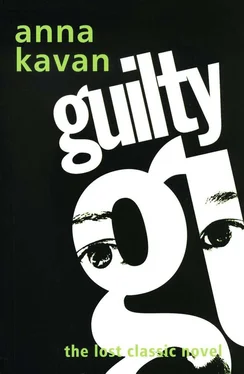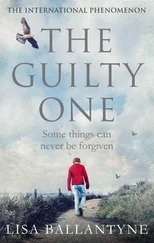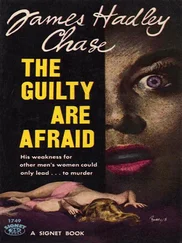Half my mind was given up to pretending that we were travelling on the ocean floor, when, suddenly and most unexpectedly, a cottage appeared in the distant circle that was the tunnel’s mouth, very minute and clear, as if seen through a giant’s green telescope. It looked so strange and remote that I didn’t recognize it at once as my home. It had to my eyes the unreal miniature air and the slightly sinister charm of a fairy-tale cottage in an enchanted wood, and even when we arrived I wasn’t exactly happy about going inside.
Nothing ominous or fearful, however, could exist in the proximity of Mr Spector, who, as soon as we’d stopped, took my hand in a friendly grip, ostensibly to help me out of the car, but really, as I knew, to assure me that everything was as it should be at home.
The rest of his visit followed the usual pattern, except that at one point, when both my parents happened to be in another part of the room, he gave me a slow deliberate wink; it had an extremely droll effect in his rather solemn face, so that I nearly burst out laughing. But afterwards I was very glad he’d substantiated our friendship and understanding in this way, as otherwise I certainly wouldn’t have dared to believe in it, it seemed so excessively improbable.
We all went to see him off when the time came, and I remember that, while saying goodbye to my father and mother, he put his hand for a moment on my shoulder and said to them over my head, ‘This young man of yours looks a bit peaky to me, as if he could do with a good blow of sea air.’ Then he climbed into the low-slung car and went beetling off. I watched the bright metal hub of each wheel turning faster and faster, till I could distinguish the individual turns no longer. He waved once and was gone.
During the next few days he was much in my thoughts; I hoped he would come and see us again soon and that he would take me out for another drive so that we could resume our talk. Then one evening my mother told me that the orphans were being taken to the seaside for a month and that I was to go with them, and after that I could think of nothing else.
I never found out whether Mr Spector actually arranged this himself or whether the hint he’d given my parents had been enough, but, in any case, he was responsible for one of the happiest holidays I’ve ever had.
So much happened to me during that month at the seaside, each day was so full of exciting and memorable events, that the individual days seemed a week long yet the month itself passed in a flash. The day of departure, at first so astronomically remote as to be unthinkable, suddenly took a great leap forward and was right upon us. It seemed to me I’d no sooner arrived and begun making friends with the orphans (who proved unexpectedly easy to know now that it wasn’t term time), and with them becoming acquainted with the fascination of sands, cliffs, rocks, concert parties, shrimping, sailing, swimming and a hundred and one other attractions, than I was back again at the station, reluctantly boarding the train that was to take us away from all these wonders, clutching a long wet ribbon of seaweed, and grimly resisting all adult efforts, both forcible and persuasive, to take it away from me.
Then, finally, it was evening, I was home again, the remains of the seaweed, much the worse for wear, still wound around my wrist. And my mother’s slight figure, like a shadow itself, was gliding to meet me out of the thick shadows in our little hall. I kissed her and rushed to hang up my precious trophy at once, waving the battered, dank strand I had persistently dragged in and out of trains and taxis, lavatories, waiting-rooms, dining-cars, till now, like regimental colours tattered in many campaigns, it came home at last to rest in the place of honour. ‘It’s a barometer, you know; you feel it, and if it feels wet it’s going to rain.’ Over the years, I can still hear my voice, shocking in that silence where no voices were ever raised, loud, triumphant, insistent with youth and with my new independence.
I’d hardly thought of my home all the time I had been away. And I remember how I glanced around me now with a sort of wonder, as the feeling of it came back, and I saw that everything was just the same as it had been before: the hushed heavy silence and the shadows that seemed more real than the figures which they surrounded. Only I wasn’t the same; I was tremendously, splendidly different. I’d come back as a conqueror, confident in myself and my health and vitality and in my ability to get on by myself in the real world among real people. Nevertheless I was struck by something implacably hostile in this remembered atmosphere, as the stubborn intractability of things and circumstances made itself felt, opposing my childish will. But I refused to be influenced by it; I was the victor returning triumphant, and would not be discouraged or silenced. Loudly I went on recounting my adventures and exploits and all that I had been doing.
Though not boisterous nor boastful by nature, I must have seemed so on this occasion, so determined was I to assert myself against this vague something in the air I felt to be inimical to me. My shadowy mother seemed to become more wraith-like under the bombardment of my ceaseless voice and relentless activity, as I rushed from room to room, opening and shutting doors, upstairs, downstairs, bringing out of my suitcase treasures I’d collected, all in a flood of talk, reminiscences, as if by myself alone I could fill the cottage with all the noise and liveliness the orphans would have made together, and so beat the silence and the shadows on their own ground.
The only room I didn’t go into was my father’s study, which I avoided purely from instinct and force of habit, without a thought for its occupant. It was only when I was completely breathless, and my spring of words had temporarily dried up, that it even occurred to me to ask how he was. For the first time I really looked at my mother, seeing the collection of miscellaneous garments draped over her arm. Because my own association with packing was so fresh in my mind, I knew at once what she had been doing when interrupted by my arrival, even before she said, ‘You’ve come back just in time to say goodbye to your father. He’s going away tomorrow — abroad.’
Her words dispersed a nameless apprehension that the thought of packing aroused; this was news I was not only relieved but delighted to hear. Remembering how happy I’d been while the two of us were alone, I imagined that history would repeat itself and I be restored to the importance I’d then enjoyed as sole object of her interest and affection. And, my expansive warmth overflowing, I was ready to love my father because he was leaving us in the morning. But the next moment I was almost hating him for the same reason, sensing that my mother was more preoccupied than usual on his account. This was my hour. I was the returning hero. He had no right to steal my place as the central figure. ‘Where’s he going? Why? Is it a long way off?’ I insistently asked, not interested, just trying to fix her attention, for I saw that her thoughts had already left me.
All of a sudden she seemed to reach a decision in her own mind, replying most unexpectedly, ‘You’d better ask him yourself.’ I stared incredulously, as hitherto all contact between us had been discouraged. ‘Yes, go and talk to him now while I get the supper — tell him I sent you.’ She spoke with a decisiveness she hadn’t displayed for a very long time. Then, smiling, went out of the room.
Knowing she wouldn’t want me in the kitchen, I was left in perplexity, faced with the alternatives of my father’s company and that of the silence and shadows. The silence became obtrusive now that I was alone; it seemed to be rising around me in a slow tide, steadily submerging all my bustle and noise. A clock began to strike in another room. I listened, counting the strokes, and when they were over the silence seemed deeper, more formidable. Old associations were starting to undermine my self-confidence, so I hastily reminded myself that I’d been away from home on my own and managed quite well. I was now independent; I wasn’t afraid of anything or anyone, I informed the study door as I opened it, and said aloud, ‘Mother sent me and told me to tell you so.’
Читать дальше












